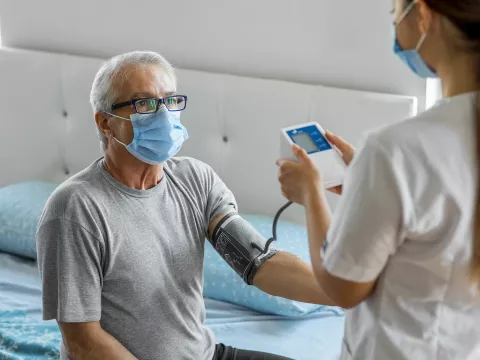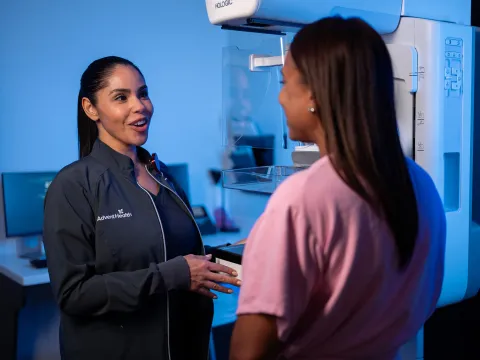- AdventHealth

Choose the health content that’s right for you, and get it delivered right in your inbox.
While it can be understandably overwhelming if you have a serious condition that requires you to have care at home, having options for your environment and style of care can help. We want you to know that you and your family won’t be alone whether you need hospice or home care. We’re here to explain the differences between hospice and home care so you can feel informed and prepared.
Hospice Care
Hospice is considered end-of-life care for someone with a life expectancy of six months or less. Ultimately, the focus of hospice is caring, not curing. Care teams help patients feel as comfortable as possible at the end of their lives.
A team of health care professionals and volunteers provides this care, offering medical, emotional and spiritual support. The goal is to help people find peace, comfort and dignity. Support for families is provided as well.
Hospice care can be provided at home or in a nursing home, assisted-living facility or an inpatient unit at a hospital. Choosing where to receive hospice care is a deeply personal decision, so make sure to talk through your options with your care team and family.
Hospice Services
Once your loved one enters hospice, your hospice care team at AdventHealth will work with you in providing daily care. Your team will likely include your loved one's primary care provider, a hospice physician, nurse case manager, social worker, volunteer coordinator, chaplain, hospice aide and a bereavement counselor — all of whom can provide quality-of-life-focused care.
The hospice services we provide include:
- 24-hour, on-call medical staff and nurse support
- Advanced care planning
- Caregiver support
- Grief support
- Inpatient units
- Medication support
- Resources for patients and families
Home Care
Where hospice focuses on end-of-life support, home care is centered on helping people heal. The goal of home health care is treating an illness or injury to help the patient heal, regain their independence and become as self-sufficient as possible.
Home care patients may work with a health care team consisting of a nurse, a physical therapist, a home health aide to assist with personal care, a social worker for short-term counseling and a dietitian to provide healthy meal guidance.
Home care can be short-term until the patient feels they no longer need help, or it can be long-term, especially where chronic conditions are concerned. It may also extend into hospice care in the future.
Home Care Services
Home care services usually include but are not limited to:
- Care coordination and communication
- Dietary assistance
- Education about self-care
- Injections, if needed
- Intravenous (IV) or nutrition therapy
- Monitoring of serious illnesses and unstable health status
- Pain management
- Patient and caregiver education
- Physical rehabilitation
- Safety management in the home
- Speech therapy
- Supervision of prescription and other drugs
- Wound care for pressure sores or surgical wounds
Hospice and Home Care for Whole-Person Health
If you’re considering hospice or home care for yourself or a family member, we’re here to help you explore all your options. We’ll be with you at every step, supporting your family physically, emotionally and spiritually while keeping your comfort in mind. For more information on the care we can provide for you and your family, learn more here.




